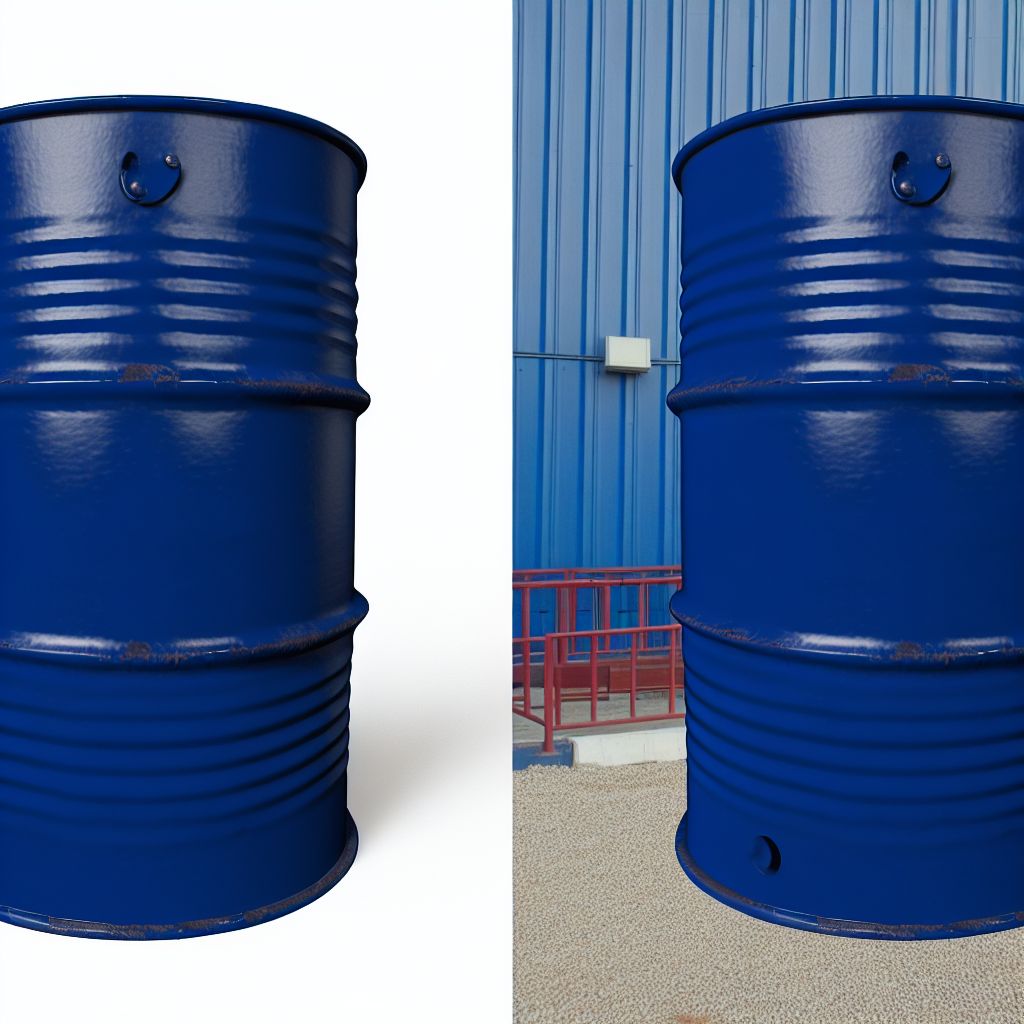Deutsch: Blaues Fass / Español: Barril Azul / Português: Barril Azul / Français: Fût Bleu / Italiano: Barile Blu
Blue Barrel refers to the standard blue barrels that are often used for storing and transporting various materials, including hazardous and non-hazardous liquids. These barrels are a common sight in environmental management contexts due to their widespread use in industries involving chemicals, oils, and water.
Description

In the environmental context, a Blue Barrel is significant because it is commonly made from high-density polyethylene (HDPE) or other durable materials, making it suitable for containing a wide range of substances. These barrels are particularly noted for their ability to safely store and transport substances that might otherwise pose risks to the environment, such as industrial chemicals, waste oils, or other pollutants. The colour blue is typically used to signify drinking water in humanitarian relief operations, but it can also denote different contents based on industry standards.
Application Areas
Blue Barrels are used across various sectors that directly impact environmental management:
- In waste management, they are used to collect and transport hazardous wastes safely.
- In water treatment and management, blue barrels are often utilized to store treated water or collect rainwater.
- In the chemical industry, these barrels are crucial for the safe handling of chemical products, minimizing the risk of leaks and spills that could lead to soil or water contamination.
- In disaster relief, they serve a critical role in storing and transporting drinking water and other essentials to affected populations.
Well-Known Examples
A notable example of Blue Barrel usage includes their role in disaster relief operations, where they are used to provide clean water storage solutions in areas affected by natural disasters such as hurricanes or earthquakes. Another example is their use in oil spill response activities, where barrels may be used to recover and temporarily store oil from contaminated waters.
Treatment and Risks
The risks associated with Blue Barrels mainly involve potential leaks and contamination if the barrels are not properly maintained or if they are reused inappropriately. Proper treatment involves regular inspections, correct labelling, and adherence to safety standards to ensure they do not become a source of environmental pollution. Additionally, the disposal of these barrels must be handled carefully to prevent environmental damage, often involving recycling or specialized waste management services.
Similar Terms
Similar or related terms include "drums”, "hazardous waste containers”, and "storage tanks”. Each of these terms describes containers used for similar purposes in environmental and industrial contexts.
Weblinks
- umweltdatenbank.de: 'Blue Barrel' im Lexikon der umweltdatenbank.de (German)
Summary
Blue Barrels play a crucial role in environmental Protection and industrial safety. Their use in storing and transporting materials, particularly in sensitive or hazardous situations, makes them an integral part of environmental management strategies.
--
Related Articles to the term 'Blue Barrel' | |
| 'Explosion' at quality-database.eu | ■■■■■■■■■■ |
| Explosion: An explosion in the context of quality management refers to a sudden and violent release of . . . Read More | |
| 'Filtration' at quality-database.eu | ■■■■■■■■■■ |
| Filtration in the context of quality management refers to the process or technique used to separate unwanted . . . Read More | |
| 'Pallet' at quality-database.eu | ■■■■■■■■■■ |
| Pallet in the quality management context is a crucial tool used in logistics and supply chain management . . . Read More | |
| 'Sediment' at quality-database.eu | ■■■■■■■■■■ |
| Sediment in the quality management context refers to particulate matter that settles at the bottom of . . . Read More | |
| 'Separator' at quality-database.eu | ■■■■■■■■■■ |
| Separator in the context of quality management is a device or process used to separate different materials, . . . Read More | |
| 'Analyser' at quality-database.eu | ■■■■■■■■■■ |
| Analyser in the quality management context refers to a device or system used to examine and measure the . . . Read More | |
| 'Plumbing' at top500.de | ■■■■■■■■■■ |
| Plumbing in the industrial context refers to the systems and processes involved in conveying fluids for . . . Read More | |
| 'Brewery' at top500.de | ■■■■■■■■■ |
| Brewery in the industrial context refers to a facility that produces beer through the brewing process . . . Read More | |
| 'Impurity' at quality-database.eu | ■■■■■■■■■ |
| Impurity in the quality management context refers to any unintended or undesirable substance or element . . . Read More | |
| 'Hardener' at quality-database.eu | ■■■■■■■■■ |
| In the context of quality management, a hardener refers to a chemical component used in combination with . . . Read More | |
